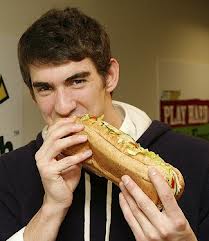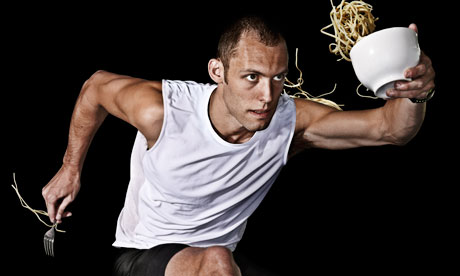
I work with athletes. Athletes like to eat. They like to eat a lot. They like to think that ‘I can eat anything…I just trained for an hour”. Or whatever the time or distance is. In reality, as an athlete, you cannot eat anything you want whenever you want if you want optimal performance. It is not just calories in vs calories out, but the quality of calories and the type of calories in the right combination that is more important.
I had a client a few years back when I first started my sports nutrition practice who was overweight and was training for a 10K running event for charity. While we made some strides with the overall eating, training and racing threw her eating habits into a tail spin. She thought “i just ran for 45 minutes, I can eat anything I want” and so would eat a buffet breakfast consisting of some 1200 calories in that meal. She would eat a stack of chocolate chip pancakes with syrup and butter, add a couple of eggs. Oh, and why not, split a sundae.
I do applaud training, but eating too many calories afterwards will not be much benefit down the road to reaching your race day goals or your race weight. You will not reach your ideal racing weight if you think you can eat anything just because you have trained. I honestly used to train so I could eat more! I was always fighting my weight. Always. The more I trained, the more I justified what I could eat. Oh, I just trained, I can eat that cookie (or 3 or 4). I can have that second beer. I can eat anything! I just worked out!
I was wrong. For many years I fought my weight until I realized that I needed to change what I was eating, and how much I was eating. I needed to start paying attention to the quality of foods I was eating, not just eat anything I could get my hands on. I could not go eat a hoagie and think I would be lean and mean, ready to go the next day (well, unless I took a 2 hour nap). I learned over the years, that I needed to start paying attention to eating real foods. I needed to start paying attention to how I really felt after eating certain foods and certain food combinations. It is not rocket science, but everybody reacts to various food combinations differently.
For me, wheat and bread makes me tired. It makes me gain weight. It makes me want to eat more wheat about 2 hours later. I just feel constantly hungry eating wheat based products. But I loved my bread! Now I have no trouble staying away from it as I did not want to feel sleepy. I did not want my joints to be achy the next day and hips stiffer than a board.
I learned that I needed to eat a recovery meal that consisted of a high quality animal protein, a high quality carbohydrate like red or sweet potatoes vs a bagel, and lots and lots of green vegetables. When I last trained for a marathon, I met a client for breakfast after an 18 miler. He was shocked that I was only eating half of the 4 egg omelet with spinach and goat cheese. I was only eating half of my roasted potatoes. “I mean, come on, if I just ran 18 miles – I can eat anything right?” Nope. I ate the smaller recovery meal, and saved the other half for 3 or so hours later, when my body could process the food again and I would be hungry. I did not need 1500 calories and a full plate of food, even if healthy, to fill me up and make me feel bloated. My body would have gotten too much food, and I would store the extra calories rather than use them to gain muscle and recover.
Many of my clients come to me to lose weight. Most are athletes. And most are surprised that when they stop eating so many processed foods, and converting more to real food, higher vegetables, less grains, more healthy fats, they have more energy. They attain their healthy weight and lose the excess body fat without feeling deprived or feeling starved. They also lose the cravings for sugar as they are able to better balance the blood sugar and eat when they are hungry vs waiting til they are starving.

if you struggle with losing body fat, or with looking like an athlete despite all the training you are doing, it might be the foods you are consuming. You might need to change the mindset from ‘I can eat anything” to “I can eat foods that make my body feel good and perform better”. Eating foods that make you feel and perform better is not about putting restrictions on the diet. It is more about helping you learn which foods work with your body, and which are actually making you tired, lethargic, sluggish and recovering poorly with achy, tired muscles and joints. There are plenty of food options out there. Pasta might not be as good to you as a baked red or sweet potato. Quinoa might be a better option than wheat pasta. Buckwheat might be even better?
When I work with my clients, it is more about expanding the options of foods to eat. I am like the professor (mad some might say), and you are doing lab in between sessions to find out which foods work better for your body. I help you eat anything you want that makes your body feel better. I help you determine how to get in touch with feeling better based on the foods you eat. You will be the one to decide if a hoagie really is worth it, or if a slice of pizza with extra cheese makes you feel terrible, sluggish or full of life. If it sits like a brick in your stomach, it might not be such a great choice. We can add things to that meal to make it better, like a side salad, or broccoli slaw or some other steamed green vegetable. Or we can find something completely different you can eat that makes you feel great after you eat it.
Changing the mindset from ‘I can eat anything because I am training (for an Ironman, marathon or century)’ to ‘I am eating to improve how I feel and how I perform’ can be the reason why you have not been able to get to your healthy race weight in the past. It might be the reason you feel like you are not making strides in getting leaner despite all the training and exercising you do. A change in food choice and the amount, can be they way to help balance the blood sugar, improve recovery and improve your lean body mass. To learn more on how to do this, please contact Joanna Chodorowska at Nutrition In Motion. www.n-im.net or 215-272-6774. She has a Race Day Nutrition Plan that can help you achieve your healthy race day weight without starving yourself. Eat real food. Get real results.
[…] protein or green vegetables and rarely do they eat root vegetables or legumes. They figure “I am training so I can eat whatever I want!”. But in reality, what you eat every day is creating more of a fat storing machine rather than a […]